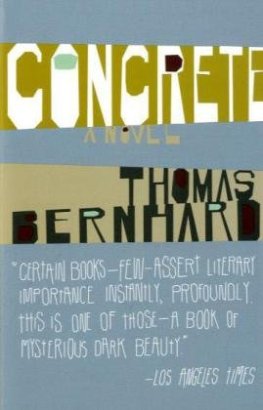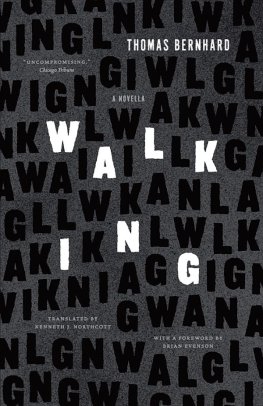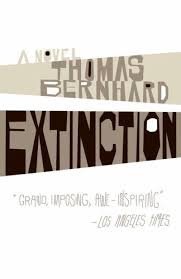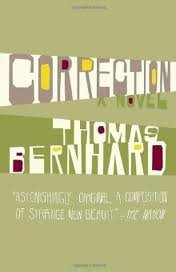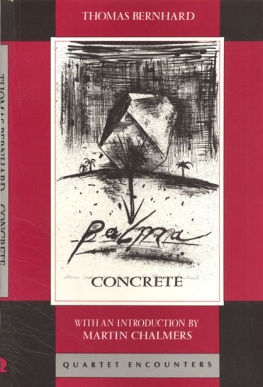Few writers, and perhaps none in recent times, have staged their departure from the world with such a masterful sense of theatre as Thomas Bernhard. Success as a writer, fame and notoriety ensured that he was certain to avoid the final humiliations often inflicted on the poor and displaced. However, Bernhard, who had often been close to death since contracting pleurisy and tuberculosis at the age of eighteen, did not want his burial to be the occasion for another kind of humiliation. He was determined that there should be no hypocritical gestures of reconciliation over his dead body by an Austrian state and an Austrian literary establishment which he despised.
Thomas Bernhard died alone, of heart failure, on Sunday 12 February 1989, at his home in Gmunden, Upper Austria. By the time the municipal authority confirmed his death on Thursday the 16th the funeral was already taking place in Vienna. Apparently three people were present. The authors testament was equally implacable. That no word of his literary remains was to be published is not a surprising demand from a writer who took such care with the ordering and correction of his texts; less common is the requirement that for the duration of legal copyright nothing he had ever written is to be performed or published:
within the borders of the Austrian state, however that state describes itself. I categorically emphasize that I want to have nothing to do with the Austrian state and I safeguard myself concerning my person and my work not only against every interference but also against every approach by this Austrian state to my person and my work for all time to come.
This uncompromising, unforgiving statement from beyond the grave is a conclusive demonstration of the hostility between official Austria and the countrys most outstanding writers even if it can also be seen as an expression of injured love. The antagonism long preceded the chain of scandals and debacles, beginning in 1986 with the Minister of Defences welcoming handshake for a war criminal released from an Italian prison, which have soiled the cosy image of Austria. These events, above all the election of Kurt Waldheim as president and the allergic reaction of Austrian opinion to external and internal criticism, have seemed to confirm Thomas Bernhards intemperate vision of Austria as corrupt and mendacious.
In post-war West Germany, one of the roles assumed by writers was to act as a public conscience with regard to the crimes committed under the Nazis and to threats to civil and democratic liberties. On occasion, this role has brought conflicts with politicians and the state. There has nevertheless existed both a considerable degree of consensus on the legitimacy of intellectuals to speak out and a sphere of public debate in which they have participated.
One telling difference between West Germany and Austria as successor states to the Nazi-Reich was that Austria refused to regard itself as such. West Germany, of course, had no choice. Gerhard Roth, another Austrian writer, has suggested that the Austrians discovered that when they had been committing criminal acts they had been Germans. So, by becoming Austrians again after 1945, their consciences, Kurt Waldheims included, were clear.
Consequently, the Second Austrian Republic put considerable effort into constructing an identity which relied on the Habsburg myth and the embalming of imperial Viennas cultural heritage. There was an avoidance not only of the Nazi period (and the divisive topics of exile and resistance) but of the First Republic as well, with its problematic features of civil war and clerfcal fascism. Music and literature or rather their existence were of fundamental importance to this identity. But since the whole edifice was fragile, and required so many subjects to remain taboo, the writers who emerged from the 1950s onwards and whose work was not safely historical or homely were viewed as disturbing threats to Austrian harmony.
A suffocating aesthetic conservatism was closely connected to other shortcomings of the Austrian scene: the lack of reputable publishers, of serious newspapers, of informed criticism. Austrian writers like Bernhard are largely published in West Germany, and frequently address their polemics on the state of affairs in Austria via the West German press. The limited possibilities for public debate have further contributed to the bitterness of the estrangement between Austrian writers and much of Austrian society.
Paradoxically, condemnation in the press and by representatives of the government helped bring writers to the attention of a reading public often outside Austria.
Bernhard himself was not shy of making public interventions. (His revulsion at Nazism and Catholicism and what he saw as their continuing influence on Austrian attitudes was almost matched by his contempt for Social Democracy and state-subsidized writers.) Nor did he tire of varying his expressions of disgust at Austria. In Concrete, for example, which was first published in 1982, theres a long passage, with something of the tone of a sermon or a jeremiad in which the narrator, while he prepares to leave Austria for a stay in Majorca, reflects that he is merely leaving a country whose lack of intellect no longer makes a man like himself despair but only vomit, and whose condition is simply that of Europes uncleaned latrine.
Of course, there is much more to Bernhard than a critic or satirist, however brilliant and vituperative, of Austrian and German circumstances. He and his work, in any case, elude political classification conservative anarchist has been one tentative description. Bernhard is a great writer for the breathless intensity with which he delineated inner geographies, the unceasing monologues inside our heads, and his marking both of the power of words not least over the readers of his prose and of the limits of words, their inadequacy as a means of communication.
Concrete presents a familiar Bernhardian situation. The narrator, a sickly scholar of private means, is unable to complete, in fact unable to begin even the first sentence of the definitive study of Mendelssohn which he has been preparing for more than ten years. More than three quarters of the book, itself a single almost uninterrupted monologue, advances reasons for not having begun to write, takes them back, modifies, corrects and then contradicts them. Every kind of distraction is, or may be, or may not be, responsible. Probably I have only again and again been unable to begin my work, because the books and writings on my desk were not properly arranged is in the end perhaps the narrators most convincing conclusion.
This calculated humour is a feature of Bernhards writing which is sometimes ignored by English-language critics who see only apocalyptic gloom and nihilism in his work. Bernhard is frequently and unexpectedly funny, as here in a novel whose flow of writing about the impossibility of writing is provoked and qualified by the narrator learning of the suicide of a person whom he barely knew.
But more than that, Bernhards whole mode of address resembles that of a comic. A stand-up comic who buttonholes the listeners attention with a sentence, an unending sentence, draws the listener in, without the latter quite understanding where these non sequiturs, alarming exaggerations, bare-faced denials are leading until the listener (the reader) finds himself entrapped within a verbal construction with new and unfamiliar rules of logic from which there is no escaping until the narrator-comics telling telling telling, which is both a curse and relief, runs out of breath. Common to both Bernhard and the comic is the reliance on, and play with, reported speech, and a constant balancing between control over words and the risk of words running out of control.

